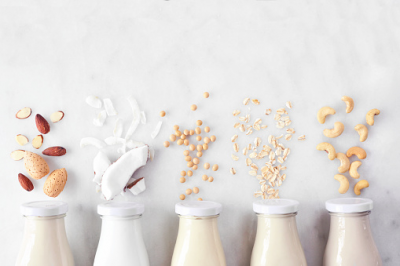Written by UConn Dietetics Student Sydney Hodges
 Dairy can be classified as products from the milk of mammals. This includes cow’s milk which is offered to us in a variety of fat levels (skim, 1%, 2%, whole (all cream included). The dairy aisle can be quite confusing because in the last twenty years or so, numerous plant-based “milk” alternatives have shown up on the shelves (almond, oat, cashew, coconut, and soy). Plant-based milk alternatives are a great non-dairy option for individuals who may experience GI discomfort after consuming dairy, however there are some key differences between cow’s milk and plant-based milk beverages that are important to know!
Dairy can be classified as products from the milk of mammals. This includes cow’s milk which is offered to us in a variety of fat levels (skim, 1%, 2%, whole (all cream included). The dairy aisle can be quite confusing because in the last twenty years or so, numerous plant-based “milk” alternatives have shown up on the shelves (almond, oat, cashew, coconut, and soy). Plant-based milk alternatives are a great non-dairy option for individuals who may experience GI discomfort after consuming dairy, however there are some key differences between cow’s milk and plant-based milk beverages that are important to know!
Differences in Plant-Based Milk Beverages and Dairy Cow’s Milk
What Your Body Gets from Cow’s Milk
Cow’s milk is a great source of protein and calcium. Protein and calcium are two nutrients that promote healthy bone and muscle development during growth. One 8 oz cup (don’t start a sentence with a number) of cow’s milk provides 8 grams of protein and 300 mg of naturally occurring calcium. Milk is also a natural source of vitamin D which is important because vitamin D enhances intestinal absorption of calcium. Cow’s milk is an excellent source of calcium because Vitamin D and Calcium interactions will promote maximum absorption of these nutrients in the body.
What Your Body Gets from Fortified Plant-Based Milk Beverages
One 8 oz cup of plant-based milk beverages including cashew, almond, coconut, or oat milk provides 0-2 grams of protein and 300-470 mg of calcium. One 8 oz cup of soy milk contains 7 g of protein and 450 mg of calcium. The 7 g of protein provided by soy milk makes it an adequate source and most like cow’s milk when focusing on the nutrients within all the plant-based beverages. While focusing on the amounts of calcium that plant-based beverages provide, it is also important to consider the type of calcium being provided. All plant-based milk beverages, including soy milk, require fortification of calcium. The added calcium to plant-based milk beverages is a rock calcium, usually calcium carbonate or calcium citrate. The body only absorbs around 30% of ingested rock calcium.
Smoothies are a tasty way to get in at least 1 cup of cow’s milk or plant-based milk alternative.
Check out this yummy and nutritious smoothie recipe:
Berry Smoothie Recipe
½ cup frozen strawberries
½ cup frozen blueberries
1 tbsp chia seeds
½ cup vanilla Greek yogurt
1 cup cow’s milk
This material is funded by the USDA’s Supplemental Nutrition Assistance Program (SNAP)
This institution is an equal opportunity provider.